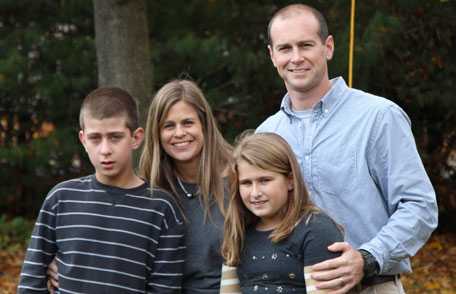Public Health Research on Fragile X Syndrome
 The Centers for Disease Control and Prevention works with fragile X syndrome (FXS) clinicians and researchers to build a data resource to help answer important clinical care and public health research questions about this condition.
The Centers for Disease Control and Prevention works with fragile X syndrome (FXS) clinicians and researchers to build a data resource to help answer important clinical care and public health research questions about this condition.
Centers for Disease Control and Prevention (CDC) researchers, in collaboration with the agency's partners, are building a foundation of public health data for fragile X syndrome. FXS is the most common known cause of intellectual disability that can be inherited. Individuals with full mutation FXS may have a range of complex health challenges from anxiety, sensory integration issues, mood disorders, and autism, to ear infections, sleep disturbance, seizures, and gastrointestinal problems.
Researchers are gathering data to describe what life is like with FXS and its co-occurring conditions, what treatments and services are being offered and which are needed, and how FXS impacts families. Analysis of these data may yield ways to address those challenges. The more we learn about FXS, the more physicians, nurses, and allied health professionals can tailor the care and services they deliver to individuals living with FXS, enabling each individual to reach their full potential. For families, better understanding FXS means having the tools they need to find and provide the best care for their loved ones.
Collecting the data
CDC funds FXS research through the Fragile X Clinical and Research Consortium, a collaboration of fragile X specialty clinics across the country. Twenty-five of these clinics enter data into the Fragile X Online Registry With Accessible Research Database, also known as FORWARD. FORWARD includes a database that allows FXS clinicians and researchers to analyze multiple data points over time from a large cohort of individuals with FXS.
CDC is the only organization currently funding this type of FXS data collection. Using these data as a foundation, clinicians and researchers can answer questions about FXS that can better guide healthcare professionals in their decisions about treatment and interventions for people with FXS, as well as support services for their families. As of June 2014, the FORWARD database contained complete baseline data on almost 500 individuals with FXS, and partial data on close to 200 additional participants. As of June 2014, follow-up longitudinal data has been collected on over 100 participants. In the future, analysis of these data can facilitate the identification of important therapeutic, behavioral and educational interventions and provide essential information to all healthcare professionals who serve the FXS population.

Fragile X syndrome is the most common known cause of intellectual disability that can be inherited.
Identifying the public health gaps
In May 2014, CDC gathered FXS stakeholders to discuss gaps in public health knowledge about FXS, and brainstorm strategies for addressing these gaps. Working from a summary of the latest FXS scientific literature, CDC identified six topic areas where public health research and programs can contribute to what's known about this complex condition. Over two days' time, researchers, clinicians, behavior and education specialists, patient advocates, and families participated in discussions about these six areas of study. The bullets below represent a summary of the discussions for the broader FXS research community to consider moving forward.
- Epidemiology—Attendees discussed the importance of being able to describe the FXS population (e.g., gender, age, race, ethnicity, and social and economic factors), more accurately calculate the number of people living with fragile X-associated disorders, and determine whether this number differs among racial or ethnic groups in the US, or varies between the US and other countries.
- Early Identification and Screening—Attendees discussed strategies for improving outreach to healthcare and allied health professionals (e.g., pediatricians, psychologists, therapists, and educators) in order to improve FXS referral and testing rates. Also discussed was the information needed before FXS could be considered for newborn screening and the role screening may have in early identification.
- Impact on Individuals and Families—Attendees discussed the need for a more complete understanding of the impact of FXS on individuals and families. With an improved understanding, strategies could be designed to lessen the impact of the condition. Attendees also discussed the need for more outreach to families, specifically focusing on the resources caregivers need to navigate complex health, social, educational, and employment systems.
- Lifespan/Transition/Aging Population—Attendees discussed the limited data available on the health and social needs of individuals with FXS and their families. Little is known about the transition out of school, employment opportunities, daily living and functional skills of adults, caregiving demands on families who provide assistance to adult children, and guardianship issues.
- Co-occurring Conditions—Attendees discussed the importance of identifying and describing conditions that occur more frequently in FXS patients (e.g., anxiety, ADHD, seizures, depression, and autism) and addressing the issues that come with these co-occurring conditions.
- Interventions and Outcome Measures—Attendees discussed the need to identify new ways of measuring changes in individuals living with FXS, and changes in the FXS population as a whole. These metrics would address the short- and long-term changes achieved through interventions and treatments.
Filling the public health gaps
Researchers at CDC are addressing limitations in public health knowledge of FXS through a series of activities. These include:
- Assessing the impact of caring for a child with FXS by leading research that compares the impact on families caring for a child with FXS to those caring for a child with autism spectrum disorder or intellectual disability.
- Using available data and generating new data that can provide a descriptive picture of people with FXS.
- Completing research projects on health concerns and services utilized among individuals with FXS as they transition from adolescence to adulthood. An example of this work is a paper on hospital visits among adolescents and young adults with FXS.
- Collaborating with the American Academy of Pediatrics to educate healthcare professionals about the importance of early identification of FXS, based on the recently published Clinical Report on the Comprehensive Evaluation of the Child With Intellectual Disability or Global Developmental Delays.
- Collecting clinician and parent reported data on symptoms, age at diagnosis, treatments and services received, cognitive function, language ability, sensory issues, social and behavioral issues, and other medical conditions. This effort is ongoing. Data from a pilot study about medical problems among people with FXS was published in 2014.
Next Steps
CDC will use the insights from the May 2014 stakeholder meeting to inform future research efforts, acknowledging that federal agencies, academic researchers, healthcare professionals, private corporations, and FXS patient advocate organizations all play an important role in addressing the needs of individuals and families impacted by FXS. In the future, CDC researchers and partners will encourage colleagues from the broader research community to use the data entered into FORWARD to address important FXS clinical care and public health research questions.
More Information
- Page last reviewed: July 13, 2016
- Page last updated: July 13, 2016
- Content source:
Error processing SSI file


 ShareCompartir
ShareCompartir